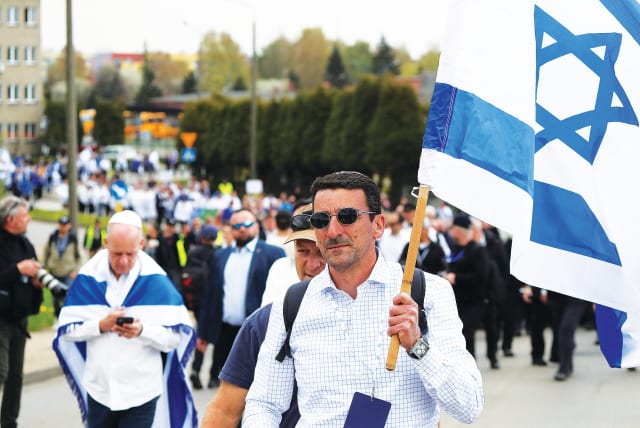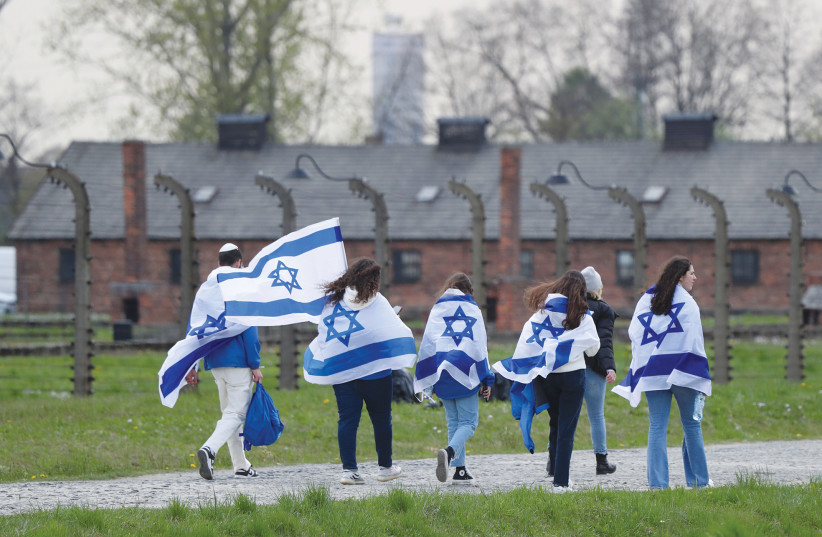What should Jews think of Poland?

MIDDLE ISRAEL: The fact that it wasn’t Nazism’s accomplice doesn't mean it wasn't plagued by antisemitism.
Hardly 16 months into the Holocaust, Mordechai Shenhavi (1900-1983) dreamt of its commemoration.
“I saw,” he later recalled his dream, “millions walking toward Zion with tombstones on their shoulders... and they chose a location, and each took down his tombstone... and the monument of their lives was thus erected... one kilometer long, one kilometer wide, and 100 meters high.”
A farmer, educator, and also a founder of a brick factory, and thus a man of both vision and action, Shenhavi later turned his dream into reality by establishing Yad Vashem, serving as its first director, and also giving it its name.
Shenhavi was also a co-founder of the atheist movement Hashomer Hatzair, but what drove him in this project reflected the fundamental Jewish command, value and instinct: “Remember!”
However, unlike Judaism’s remembrance of the Exodus on Passover, or its celebration of the Creation every Friday night, the Holocaust’s commemoration had to involve non-Jews. Its archiving effort required collecting documents from dozens of countries, and its testimonial project had to be intercontinental, as did the resolve to locate and reward non-Jews who saved Jews.
The Holocaust’s commemoration was then further internationalized, twice: first, when Communist Poland allowed Israeli schools to visit the death camps, and then, when Holocaust museums began proliferating worldwide.
Even so, no foreign government tried to interfere in the Jews’ engineering of the remembrance effort that Shenhavi pioneered.
No government, that is, except the current government of Poland, whose interference in this effort just reached a bizarre anticlimax, part of a broader quest to shape what non-Poles think of Poland, a quest that insofar as the Jewish people is concerned will surely fail.
Reinstating visits to Poland for Israeli students
FORTUNATELY, ISRAELI youths’ visits to the death camps now stand to resume after Israel suspended them last year, officially due to disagreements on security arrangements, but apparently due to impatience with Polish intrusion in the visits’ design.
Unfortunately, Israel now accepted Polish interference in the visits’ planning, and reportedly did so in a way that might serve antisemitism. Yet before scrutinizing that deal, one must understand the Polish state of mind, whose roots lie in a just cause fueled by genuine pain.
That Poland was one of Nazism’s major targets and victims goes without saying. What does need to be said is that the Poles, a nation that the Nazis designated for enslavement and defined as racially inferior, were not consulted or deployed when the Germans decided to contaminate their land with death factories.
One therefore had to identify with Polish leaders who fumed when then US president Barack Obama spoke in 2012, in Warsaw, of “Polish death camps,” even if that phrasing reflected more ignorance than malice. The sense of insult which that remark sparked later inspired Poland’s passage of a law that made it illegal to accuse the Polish nation or state with complicity in the Holocaust.
Beneath what may seem to foreigners like petty semantics, simmer traumas that run back centuries. The harsh fact of Polish history is that the Poles were, and remain, wedged between the Germans and the Russians, two much larger nations that have taken turns at invading, subduing and dismembering Poland, and thus condemning it to centuries of subjugation, humiliation and despair.
The consequent sense of insult and wrath is to Polish memory what antisemitic trauma is to Jewish memory.
This, then, is the backdrop to Poland’s urge to engineer the rest of the world’s understanding of its past, and this is the context in which Jerusalem and Warsaw have now agreed that Israeli schools’ journeys to the death camps will include a visit to at least one Polish-history site, to be picked from a list of 32 sites that the two governments have just approved.
That list, say the deal’s critics, is where the problem lies, because it includes museums that glorify antisemites like Józef Kura (1915-1947), a Polish freedom fighter charged by many with murdering Jews. Yad Vashem, which was not consulted by the negotiators, says some of the sites on the list are indeed unsuitable for educational visits.
Where, then, does all this lead?
THE BOTTOM LINE of this saga is that the journeys to Poland will resume without effectively changing. The teens will visit only one Polish-selected site, and it will obviously be one of the list’s noncontroversial choices, which include Jewish museums and synagogues.
At the same time, Poland has shown it has a memory problem. The fact that Poland was not Nazism’s accomplice but its victim does not mean it was not plagued by antisemitism. It was.
Polish clerics preached against the Jews over the centuries, Polish governments discriminated against the Jews, and Polish mobs massacred Jews, as happened in summer 1941 in Jedwabne, where local Poles locked hundreds of Jews in a barn and torched it, and as happened five years later in Kielce, where dozens of Holocaust survivors were shot and stabbed to death.
Some Polish leaders’ willingness to acknowledge this history and allow its free academic research and public discussion is doubtful at best. As long as they let honor overshadow truth, they can’t expect to shape everyone else’s view of history, least of all through governmental acts. Faced with any Ministry of Truth’s tinkering with the past, people will not adopt its version of the past, and instead will ask: What’s it trying to hide?
The effort to fiddle with memory certainly won’t work with the Jews, who recall all too well the ancient command (Deuteronomy 25:17-18) “do not forget” those who, “undeterred by fear of God... surprised you on the march, when you were famished and weary, and cut down all the stragglers in your rear.”www.MiddleIsrael.netThe writer, a Hartman Institute fellow, is the author of the best-selling Mitz’ad Ha’ivelet Hayehudi (The Jewish March of Folly), Yediot Sfarim, 2019, a revisionist history of the Jewish people’s political leadership.
Jerusalem Post Store
`; document.getElementById("linkPremium").innerHTML = cont; var divWithLink = document.getElementById("premium-link"); if (divWithLink !== null && divWithLink !== 'undefined') { divWithLink.style.border = "solid 1px #cb0f3e"; divWithLink.style.textAlign = "center"; divWithLink.style.marginBottom = "15px"; divWithLink.style.marginTop = "15px"; divWithLink.style.width = "100%"; divWithLink.style.backgroundColor = "#122952"; divWithLink.style.color = "#ffffff"; divWithLink.style.lineHeight = "1.5"; } } (function (v, i) { });

